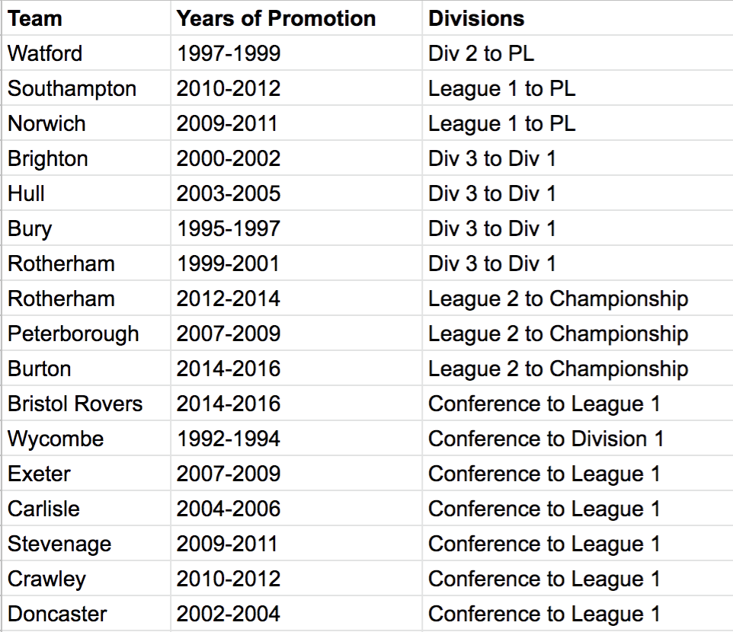Achieving promotion is the pinnacle of the game for most football clubs. Although winning silverware is the main aim for most of the big clubs, for those in the Football League it is all about promotion. Nine months of hard work and effort can come down to a few minutes of football but it is always a big achievement to reach the division above.
But how about following it up with another promotion the seasons after? In a tougher division with more finances involved and better quality opposition, surely most clubs would be satisfied with avoiding relegation or a mid-table finish. This is so often the case and this season in the top four divisions, only three clubs are still in contention to make it back to back promotions.
One team that looks certain to make that happen is Luton Town in League One. The leaders of the third tier now have a five-point cushion at the top of the division and are playing some incredible football despite losing manager Nathan Jones to Stoke midway through the season. This comes after they finished second in League Two last season, securing automatic promotion.
Other teams in the mix to record successive promotions are Coventry, on the edge of the League One play-offs and Tranmere who look set to finish in the top seven of League Two after coming up from the National League last season. But how often does this feat take place? The Sportsman has crunched the numbers in the top five divisions of English football since 1992 and come up with the answers.
Luton and Coventry and both take inspiration from seven sides as promotion from the League Two (or its equivalent) to the Championship is the most common occurrence over the past 25 years. It appears the step up from League Two to League One is small, with clubs such as Brighton, Peterborough and Rotherham achieving the double promotion up to the Championship in recent years. Who can forget Steve Evans charging down the touchline.
The last team to achieve this particular double was Burton Albion, who reached the Championship in 2016 after a spectacular rise through the divisions.
Heading from the National League straight up to League One is also equally a common occurrence which is to be expected given the lower quality at that level. The one thing preventing this from being an even more likely occurrence is the fact that only one team is automatically promoted from the fifth tier of English football, making promotion a more difficult prospect for those sides.
Despite this, seven sides have done the double up from the Conference including Bristol Rovers, Carlisle and Stevenage. Crawley in 2012 were the last team to make it up to League One, but of course, Tranmere could take that title this season with two consecutive play-off successes.
The big one though, promotion from League One up to the Premier League in two seasons, has only been done three times in the past 27 years. No side looks like adding to that number this year with Rotherham, Wigan and Blackburn all loitering in the bottom half of the table, but let’s look at the sides who did pull this off.
Southampton were the most recent side to achieve this as Rickie Lambert fired them to the promised land just 12 months after they had finished second in League One. Since then the club have established themselves as a well-respected Premier League club, decent.
Saints actually replicated Norwich from the season before, who won a remarkable 52 league games over two seasons to book themselves a spot in the top flight. Paul Lambert was heralded as a hero around East Anglia before he returned to those parts as a villain, as manager of Ipswich Town earlier this year.
Graham Taylor also pulled off this feat with Watford in the late 90’s. The iconic manager transformed his side from Division Two strugglers into Premier League players in a matter of months and it was a truly incredible achievement.
Other clubs have fired through the divisions in non-league in a short amount of time, but we have only focused on the top five tiers. We must give an honourable tip of the cap to Fleetwood, who achieved six promotions in a decade to get themselves into the Football League and of course AFC Wimbledon, who rose from the ashes to secure their place back in League Two with an incredible run of promotions. This season, Salford City are also in contention to make it back-to-back promotions and could make it into League Two for this season, but they haven't made this list due to the fact one of their promotions came in the sixth tier.
At the other end of the scale, only one side in English football has been relegated three times in a row, Luton Town. Between 2006 and 2009 they dropped from the Championship to the National League amid off the pitch issues and financial troubles. Portsmouth, of course, are the team to drop from the Premier League to League Two in the quickest time, taking just four years to plummet down three divisions, also with financial issues.
Below we have listed the full table of back-to-back promotions, will we be adding Luton, Coventry or Tranmere to this list at the end of the season?
